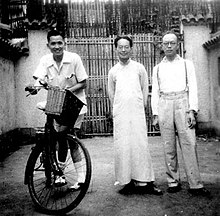Shen Congwen

Shen Congwen (沈從文Chinese 沈从文 * 28. December 1902 in the district of Fenghuang Autonomous District Xiangxi in the province of Hunan , † 10. May 1988 in Beijing ) was a Chinese writer .
Life
As the son of an officer's family , he witnessed the horrors of the 1911 revolution up close when it reached his hometown. At the age of 15 he first became a soldier himself . His later works are decisively influenced by this time in the mountainous areas bordering the Sichuan province and, according to his origins, his protagonists come primarily from a simple milieu or belong to the Miao ethnic minority . His paternal grandmother was of Miao nationality and his mother was Tujia .
After retiring from the military, Shen Congwen initially worked in various professions on a trial basis before deciding to study in Beijing in 1922 . At the same time, the publication of a first story in 1923 marks the beginning of his literary creative period.
After a short interlude as editor of the literary supplement of the newspaper Dagong, several positions as a professor of Chinese language follow . When the People's Republic of China was founded in 1949, as his books did not meet the Communist standards of literature, he was the victim of a campaign during which he was attacked as a bourgeois writer and which ended in an attempt to commit suicide. Since then he has been working at the Museum of Chinese History , but only publishes scientific papers.
During the cultural revolution he was again the victim of a smear campaign and in this context in 1969, at an old age, he was forced to do physical labor, but was finally rehabilitated again after its end.
From 1978 researcher at the Institute for History of the Academy for Social Sciences again, in 1980 one of his novels served as the basis for a script. Two years later he became a member of the Association for Literary and Artistic Circles, and one year later he was promoted to the country committee of the Political Consultative Conference of the Chinese People .
Compared to other authors of this era, his work is characterized by the strong influence of tradition and classical literature.
Works
- Ducks (《鴨子》 Yāzi), 1926 - short stories
- Oranges (《蜜柑》 Mìgān), 1927 - short stories
- Alice's Adventures in China (《阿麗思 中国 遊記》 Ālìsī Zhōngguó Yóujì), Volume I, 1928 - based on Lewis Carroll
- Shadows in the lamplight, 1928 - Chinese processing of the decameron
- Xiao-Xiao (《蕭蕭》 Xiāoxiāo), 1929 - story
- Alice's Adventures in China (《阿麗思 中国 遊記》 Ālìsī Zhōngguó Yóujì), Volume II, 1931
- The Marble Boat (《石子 船》 Shízichuán), 1931 - anthology with short stories
- Memories of Ding Ling (《記 丁玲》 Jì Dīng Líng), 1934 - Biographical essay
- The border town (《邊城》 Biānchéng), 1934 - novella
- Memories of Ding Ling (《記 丁玲》 Jì Dīng Líng), Volume II, 1940
- Shen Congwen's autobiography (《從 文 自傳》 Cóngwén Zìzhuàn), 1943
- Under cover of the night, 1947 - stories
- Sunny day after the snowfall (雪晴 Xuěqíng), 1947 - novel
- Long River (《長河》 Chánghé), 1948 - fragment of a novel
- Dragons and Phoenix in Art (《龙凤 艺术》 Lóngfèng Yìshù), 1960
- Lacquerware from the Warring States Period (《战国 漆器》 Zhànguó Qīqì), 1962
- Clothing and ornamentation in ancient China (《中国 古代 服饰 研究》 Zhōngguó Gǔdài Fúshì Yánjiū), 1981
Web links
- Literature by and about Shen Congwen in the catalog of the German National Library
| personal data | |
|---|---|
| SURNAME | Shen Congwen |
| BRIEF DESCRIPTION | Chinese writer |
| DATE OF BIRTH | December 28, 1902 |
| PLACE OF BIRTH | Fenghuang (Xiangxi) |
| DATE OF DEATH | May 10, 1988 |
| Place of death | Beijing |